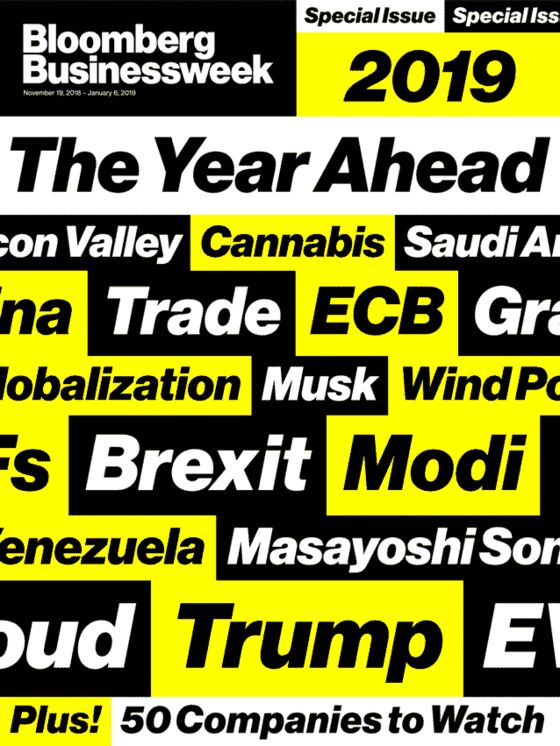The World Will Suffer If China’s Nonstate Economy Runs Dry
The World Will Suffer If China’s Nonstate Economy Runs Dry
(Bloomberg Businessweek) -- For the better part of four decades, the rise of China’s entrepreneurial class has seemed unstoppable. Unleashed by Deng Xiaoping’s reforms beginning in the late 1970s, the country’s private businesses have fueled the biggest economic boom in the world.
But what if China’s nonstate sector isn’t as strong as it looks? What if, instead, it’s been pushed along by risky lending and frothy financial markets? That fear, along with concerns about increased government meddling, gripped investors in 2018. As domestic financial conditions tightened, Chinese equities went into the deepest sell-off among major stock markets.

The turmoil has ratcheted up pressure on the ruling Communist Party, which already faces the difficult task of combating an economic slowdown while at the same time preventing the country’s record debt burden from triggering a crisis. A failure to thread that policy needle could affect markets and economies around the world in 2019. China’s leaders “are fighting fires on so many fronts now,” says John-Paul Smith, the London-based founder of Ecstrat Ltd. whose bearish stance on Chinese stocks in recent years has proved prescient. “Investors at the very least should be preparing for slowing growth. At the worst, there’s a possibility of considerable financial instability.”
Nonstate companies have lost at least $992 billion in market value since mid-June, or about $32 million for every minute of trading, according to data compiled by Bloomberg and WisdomTree Investments Inc. In October their shares tumbled at the fastest pace in more than three years relative to companies with government ownership. Local corporate borrowers, almost all of them privately owned, defaulted on a record $6.6 billion of debt in the third quarter. At least 57 nonstate businesses have accepted government bailouts in 2018. Such a wave of quasi nationalizations would have been unthinkable just a few years ago.
The pain has been felt at companies large and small—from internet behemoth Tencent Holdings Ltd. to Jiaxing Linglingjiu Electric Lighting, a producer of thermal bulbs whose owner is weighing whether to ditch the business to go farm a plot of land in China’s rural northeast. “When we meet with fellow factory owners, we don’t ask, ‘How’s business?’ like in previous years,” says Xu Xihong, who started Jiaxing Linglingjiu in 2009 after moving into a factory abandoned by a bankrupt state-run manufacturer of electric fans. “Now it’s ‘Do you think you will make it through the year?’ and ‘When are you going to get evicted?’ ”
Donald Trump’s tariffs and the Federal Reserve’s interest-rate hikes have played a role, but the biggest triggers have been local. By far the most important: the Chinese government’s almost two-year campaign to rein in the country’s $9 trillion shadow banking industry—financial companies that aren’t regulated like traditional lenders. While the clampdown was designed to make China’s financial system safer and more transparent, it’s crimped a key funding channel for private-sector companies that lack access to state-run banks. Faced with a drying up of credit and the country’s weakest economic expansion since 2009, more small businesses are defaulting on debt or liquidating.
Larger companies, including Tencent and conglomerates such as Dalian Wanda Group Co., have been hurt by tighter regulations, contributing to a growing perception among investors that President Xi Jinping, who may rule China indefinitely after he scrapped term limits this year, wants to prevent nonstate companies from growing too powerful. Under Xi, leaders have called for stronger party guidance of entrepreneurs. A phrase increasingly whispered in business circles: “Guo jin min tui,” or “The state advances, the private sector retreats.”
Optimists see the jump in private-sector defaults as a healthy purge of companies that have been propped up for too long by reckless shadow lenders. Strong companies are still growing. Private-sector investment in fixed assets rose at an 8.7 percent annual rate in September, up from 2.5 percent two years ago, according to government statistics. Bytedance Ltd., a Beijing-based online media startup, raised $3 billion in October in a deal that valued the six-year-old company at $75 billion.
Skeptics say China’s market turmoil is a sign that the country has backtracked on Deng’s reforms and failed to develop sustainable financing options. They also see rising odds of a policy misfire as tumbling share prices add to a long list of challenges, including the trade war with the U.S. and a weakening yuan.
The government has announced steps to ease funding strains, such as a requirement that a third of new bank loans go to private-sector companies. But the measures unveiled so far haven’t been strong enough, says Liu Xingqiang, president of a trade group for small and midsize enterprises in Hebei province. He says about 80 percent of the companies he sees are “dragging out their feeble existence” and that state banks remain reluctant to lend. “For us,” Liu says, “the banks will only add icing to the cake and never offer fuel in snowy weather.”
To contact the editor responsible for this story: Michael Patterson at mpatterson10@bloomberg.net, Pat RegnierHoward Chua-Eoan
©2018 Bloomberg L.P.
With assistance from Editorial Board